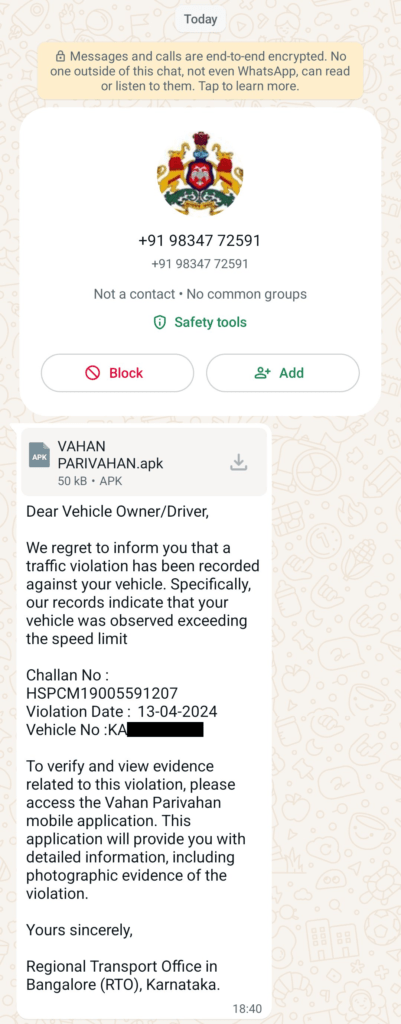Beware | Fraudsters posing as RTO officials sending WhatsApp messages to pay fine

Imposters are posing as RTO officers and sending fraudulent links through WhatsApp to pay traffic violation fine.
A new method of cheating people has come to light where fraudsters claiming to be RTO officials are sending WhatsApp messages to people, citing their vehicle number asking them to download an app and pay the fine.
Recently, users in Bangalore, received WhatsApp messages informing them that there was a speeding ticket in their name, citing the correct vehicle number. They then asked to download a bogus ‘Vahan Parivahan’ app on their phone to check the details of the challan and make payment. Once the bogus app is downloaded, all the information and data in the phone is now at the disposal of the fraudster!
What tricks users into downloading these fraudulent apps is the correct combination of vehicle number and their phone number. However, this data can easily be found out at multiple sources. One such source is when you make an entry at the security gate of any residential society or any other building. The vehicle number and the mobile numbers are captured together and the security guards or any other person having access to such a database can easily either use it themselves or sell it to someone to execute a fraud.

It is always advisable to visit https://echallan.parivahan.gov.in/ to verify any traffic violations penalties pending against your vehicle or driving license. Alternatively, search and download NextGen mParivahan app on your phone. It is the official user app from the Ministry of Road Transport and is available for both Andriod and iOS users. You can also verify the phone number from which the message was sent using Truecaller app or UPI and you will easily get the details of the person/organization in whose name the phone number is registered.
Do not immediately click on any links or download any application mentioned in any WhatsApp message. Always double check with trusted government sites or applications and if need be, visit the government office and do a physical verification. Yes, it is an extra effort but better than loosing all your life’s savings to a fraudster. Fraudsters are constantly looking for new ways to dupe people. Stay vigilant, stay safe!








